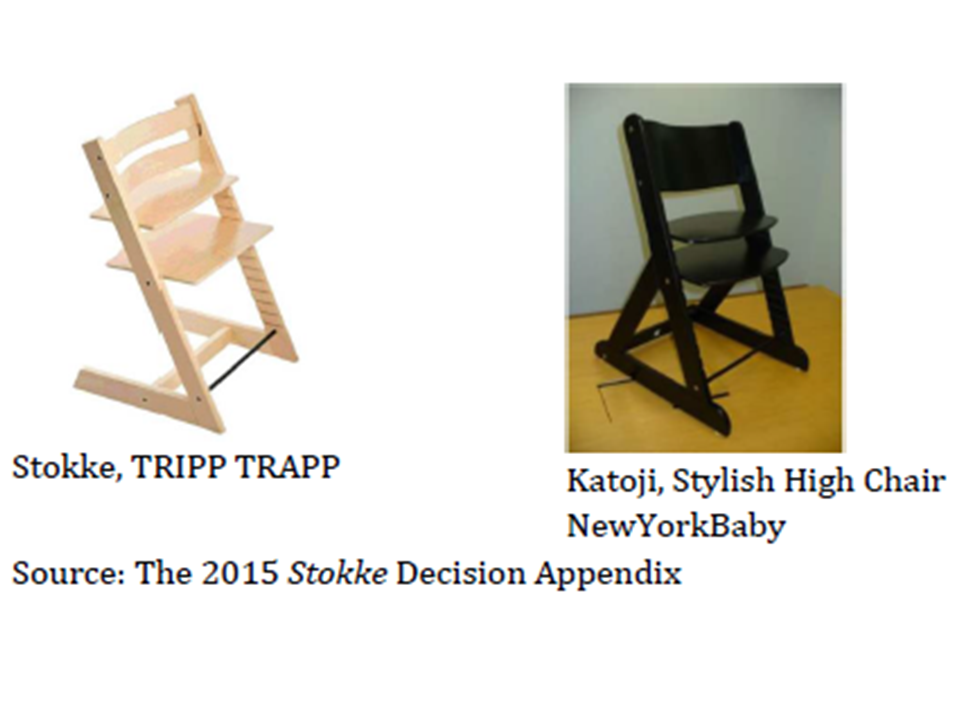IS THIS JUST A CHAIR OR NOT?
Territory:Japan
Practices:Intellectual Property
Category:Cases
Kodai Kimura
Attorney at Law of the Law Division
One morning, before going to my office, I was working on an unfinished legal update whilst sitting in a chair. My 5-year old son said “Daddy, don’t sit in my chair. It’s mine.” “Good point I am thinking! This is just a chair, isn’t it?” I answered him. “What are you saying daddy?” he replied.
I believed that this was just a chair but the Intellectual Property High Court of Japan did not think so.
The 2015 IP High Court case Stokke v. Katoji involved Stokke’s children’s chair “TRIPP TRAPP.” (Footnote 1) In this case, Stokke sued Katoji for copyright infringement in part since they sold competing high chair products. The IP High Court ruled that Stokke’s TRIPP TRAPP is copyrightable under Japanese Copyright Law. This was a shocking decision for practitioners including me, and almost made me fall out of my son’s chair when I heard about it.
(Footnote 1) Stokke v. Katoji, Intellectual Property High Court, April 14, 2015, Hei 26 (ne) No. 10063.)

Before this decision, Japanese courts including the first instance decision in Stokke v. Katoji at the Tokyo District Court tended to deny copyrightability of industrial designs particularly 3-dimensional designs such as chairs, since it was considered necessary to harmonize protection between Copyright and Design Laws. (Footnote 2) Courts used to set a standard that applied arts, which mean useful articles industrially applied, can be copyrightable if they are viewed equivalent to fine arts or works of artistic craftsmanship, which was practically a high hurdle to clear.
(Footnote 2) Stokke v. Katoji, Tokyo District Court, April 17, 2014, Hei 25 (wa) No. 8040.
However, the Stokke decision held that “there is no reasonable reason to limit a finding of copyrightability for applied arts on the ground of a protection by Design Law.” If an applied art has originality, for qualifying copyright protection, then it is copyrightable, the IP High Court observed.
In conclusion however, the Stokke decision denied copyright infringement because the Katoji products are not similar to the TRIPP TRAPP. Having said that, the Stokke decision would significantly affect our practice since every industrial product could be copyrightable if they are deemed to have originality under the Copyright Law, which is usually a low threshold.
This means that a copyright holder can assert copyright infringement even if another photographed the copyrighted product. The copyright holder can argue copyright infringement if another produced a slavish copy of the product even though the copyright holder has no design registration under the Design Law. This would especially work from 3 years after the first sale since the Unfair Competition Prevention Act prohibits the production of slavish copies of a product design for 3 years from the first sale in Japan. (Footnote 3) I wonder if the Stokke decision will become a predominant stance of courts in the future. Only time will tell, but nevertheless, we have to know about this decision at least.
(Footnote 3) Unfair Competition Prevention Act, article. 2, paragraph. 1, no. 3 and article. 19, paragraph. 1, no. 5.
Next morning, during our breakfast, I asked my son sitting in the TRIPP TRAPP, “Is this just a chair or not?” My son answered in a confident tone, “Daddy, this is my chair.” I thought then that he might one day become a lawyer because his analysis was the same as mine.
Legal updates on Intellectual Property
Telephone
+81(3)3270-6641

